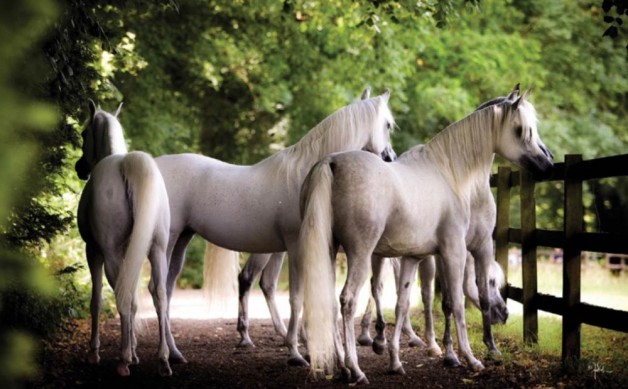By Nancy Diehl, VMD, MS
Besides the genetic effects on temperament, there are many things to look at in the postnatal environment. Factors such as the mare, farm, and handlers could also influence the foal’s outward behavior.
Q. What factors do you think contribute to a foal’s demeanor? My mare had two consecutive foals, raised at the same farm and handled in the same manner by the same people. One was very social and sweet; the other was ill-mannered and even aggressive at times. Were they just inherently opposite, or could something have caused their behavior differences?
A. It’s really interesting to observe similarities and differences in a mare’s foals over the years. As I’m sure you’re aware, many things can contribute to a foal’s demeanor.
We know genetics play a role in behavior and temperament traits. I should say we know this in broad terms, most obviously in the general temperament differences we see among breeds of horses. We haven’t really fine-tuned the heritability of specific temperament traits in a family line of horses quite as well as we have certain physical traits. Plus, the behaviors that we can best measure that help us understand temperament are going to come from the expression of not one but multiple genes as well as the influence of the external environment and experience.
Scientists are learning that gene expression is influenced even by the cellular environment. So metabolic things that occur in an individual, even prenatally, can affect how genes act to produce the physical and behavioral phenotypes we can see.
You didn’t say if the foals were from the same sire. There have been some studies that have shown specific effects of the sire on temperament and behavior. So adding up the 50% genetic material from the mare, 50% from the stallion, multiple genes acting to produce temperament and measureable behaviors, and the cellular effects on gene expression, it’s not surprising that even full siblings under homogeneous conditions might show different temperaments.
Besides the genetic effects on temperament, there are many things to look at in the postnatal environment. How a foal actually behaves, reacts, or displays a personality might start with genetics but is plastic and depends on his experiences. Although you describe a very consistent environment including mare, farm, and handlers, I can think of a number of factors that could influence the foals’ outward behavior on top of his genetics.
First, perhaps the mare changed. If she was a maiden the first year, she could certainly show different behaviors herself between her first and second foal, as compared to the consistency we kind of expect from mares who have had many foals. A change in her level of protectiveness between years could influence the foal, either in how much she physically permits him to be exposed to other people and horses, or how he reacts to her response to people or other horses.
Some things on the farm might have changed. There might be more or different horses, other animals, or visitors that give the foal a chance to see or react to new things. A foal’s level of reactivity, or his emotional and behavioral response to novelty, may have a strong basis in genetics. So if this year’s foal has many more opportunities to react to novelty in his environment, that exposure might really make a temperament difference that jumps out at you. In general, some aspects of temperament might be there but not apparent to us when the foal is in a sedate, unchallenging environment, but we’ll discover them when the foal is older and brought in to actually learn some new skills in a new setting.
Even though the handlers have stayed the same and apparently are doing things in the same way, they are still another year older. They have had different experiences over the past year and might be trying some new, if even subtle, techniques. Also, we know that it is difficult to get caretakers to agree on many horse personality characteristics. So it could be that one caretaker identifies a foal as sweet, and another identifies him as pushy. So not only do we have a temperament identification variable, but also perhaps a subconscious effect of how a caretaker behaves based on her perception of a foal’s personality.
Still, I completely understand your curiosity about this. I have two mares, each with distinctly different personalities and typical behaviors, bred to the same stallion on my farm every year. The foals from each have quite distinctive and consistent temperaments which I think I can identify as a mix of the dam’s genetic contribution plus the difference in each dam’s protectiveness of the foal (translating into how easy and often I can interact with the foal). So I would be surprised if one of the mares had a really different type of foal one year. I would mostly figure it was just the way the genes got mixed up in this particular egg and sperm combination if what I was seeing seemed to be a basic temperament trait that was highly apparent at a very young age.
It will be interesting what differences you see in how these foals are to handle and train as this new one gets older. There are differences in heritability of temperament compared to heritability of handling and learning traits. Plus, the foals will have so many more experiences to build on their baseline genetic status. Their early temperament differences may end up in a wash with two equally trainable and skilled adults.



